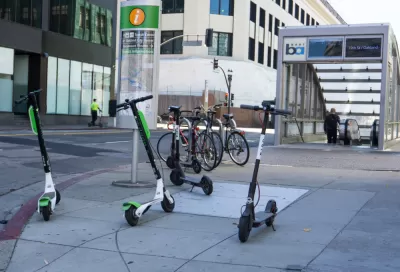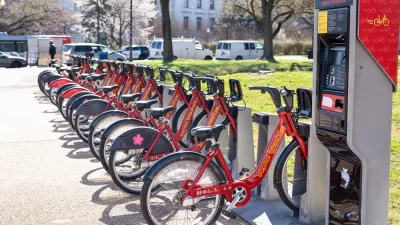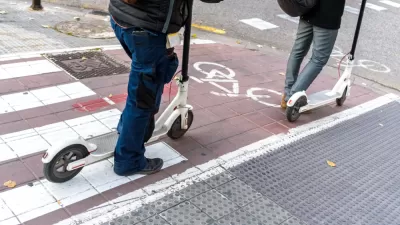With some strategic planning on the part of transit agencies and operators, shared e-scooters can be an important ally in the fight against car dependence.

E-scooters have the potential for an important role in a comprehensive public transit system, writes Xiang ‘Jacob’ Yan in Greater Greater Washington. Despite their reputation as mostly recreational, "research suggests that most e-scooter trips are not taken for fun but for utilitarian purposes such as work and school commuting. In the past year, for those avoiding crowded spaces like buses and trains because of COVID-19, e-scooters can be a lifeline for people with few other travel options." Washington, D.C., according to Yan, "has been a pioneer in embracing e-scooters and e-bikes and developing regulations to make them a safe, accessible, and equitable travel option."
"There are good reasons to worry that privately operated e-scooters — much like ridesharing companies like Uber and Lyft — could draw riders away from transit and hence threaten the recovery of public transit systems." Indeed, Yan's research shows that "more than 90% of e-scooter trips could have been made by Metro or CaBi." However, in many instances, "[e-scooter] usage was different from the Capital Bikeshare (CaBi) system — the services were complementary, not competitive." Prior to the pandemic, "between 8% and 12% of all e-scooter trips were taken to connect with Metrorail."
Yan argues that "the popularity of e-scooters and e-bikes suggests that cities like DC should be treating dockless vehicles as an essential component of public transportation systems" and "find ways to make e-scooters complement rather than compete with existing public transportation systems." Through some collaborative planning with the e-scooter operators, DDOT can foster a "harmonious integration of e-scooter services with Capital Bikeshare and Metro." Transit agencies can "promote e-scooters as a last-mile feeder to public transit" by creating safe and convenient infrastructure such as e-scooter parking and charging stations at transit hubs, bike and scooter lanes to make riding safer, and integrated fare payments or bundled pricing. To achieve these advancements, writes Yan, transportation officials must "think of e-scooters not as a separate mode but as a part of the transportation ecosystem," bringing the industry in as "an important ally in the war against car dependence."
FULL STORY: Make e-scooters work with transit, not against it

Study: Maui’s Plan to Convert Vacation Rentals to Long-Term Housing Could Cause Nearly $1 Billion Economic Loss
The plan would reduce visitor accommodation by 25,% resulting in 1,900 jobs lost.

North Texas Transit Leaders Tout Benefits of TOD for Growing Region
At a summit focused on transit-oriented development, policymakers discussed how North Texas’ expanded light rail system can serve as a tool for economic growth.

Using Old Oil and Gas Wells for Green Energy Storage
Penn State researchers have found that repurposing abandoned oil and gas wells for geothermal-assisted compressed-air energy storage can boost efficiency, reduce environmental risks, and support clean energy and job transitions.

Private Donations Propel Early Restoration of Palisades Playground
Los Angeles has secured over $1.3 million in private funding to restore the Pacific Palisades playground months ahead of schedule, creating a modern, accessible space that supports community healing after recent wildfires.

From Blight to Benefit: Early Results From California’s Equitable Cleanup Program
The Equitable Community Revitalization Grant (ECRG) program is reshaping brownfield redevelopment by prioritizing projects in low-income and environmental justice communities, emphasizing equity, transparency, and community benefits.

Planting Relief: Tackling Las Vegas Heat One Tree at a Time
Nevada Plants, a Las Vegas-based nonprofit, is combating the city’s extreme urban heat by giving away trees to residents in underserved neighborhoods, promoting shade, sustainability, and community health.
Urban Design for Planners 1: Software Tools
This six-course series explores essential urban design concepts using open source software and equips planners with the tools they need to participate fully in the urban design process.
Planning for Universal Design
Learn the tools for implementing Universal Design in planning regulations.
Ascent Environmental
Borough of Carlisle
Institute for Housing and Urban Development Studies (IHS)
City of Grandview
Harvard GSD Executive Education
Toledo-Lucas County Plan Commissions
Salt Lake City
NYU Wagner Graduate School of Public Service





























